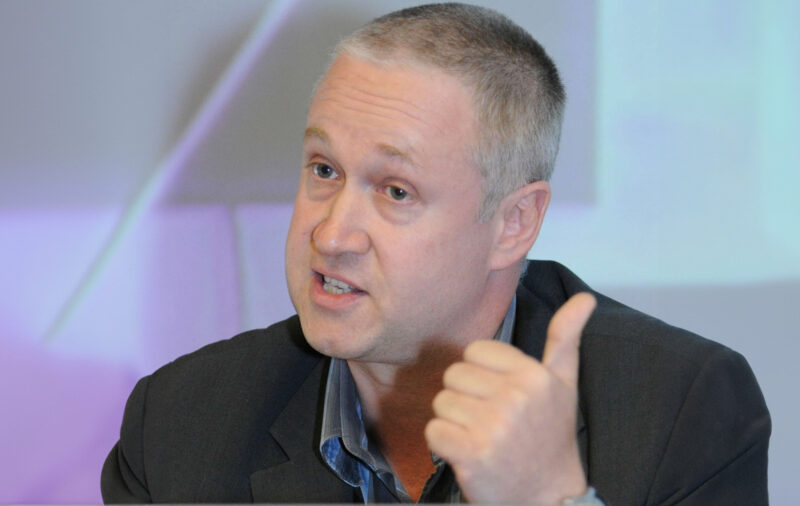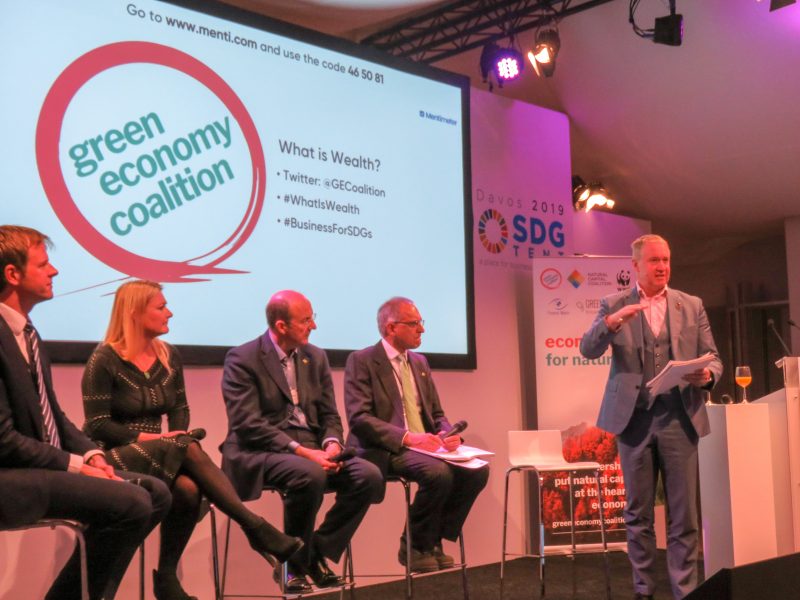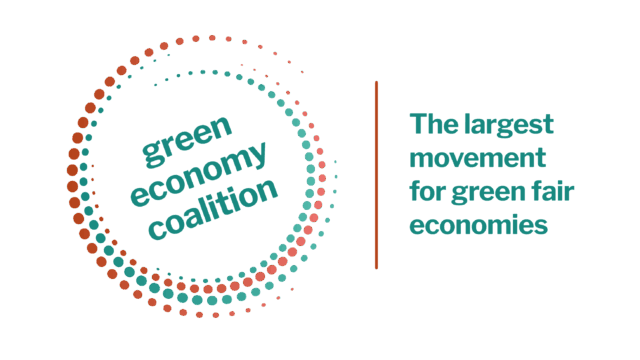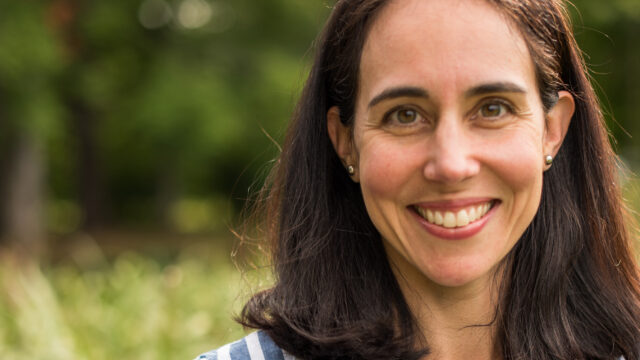Our convenor Oliver Greenfield shares his thanks
After 14 years leading the GEC, Oliver is leaving for pastures new. Here he pays tribute to colleagues and collaborators over the years

Today we announce the news that our Convenor Oliver Greenfield is stepping down from leading the Green Economy Coalition – a role he has fulfilled for the last thirteen years. Here, Oliver gives thanks to colleagues and collaborators from his decade on the frontlines of the green economic transition.
As I step down from the GEC, I’m reminded of the old adage - we all walk our own paths, but when we walk together, we can go further. Today I’d like to thank my fellow path-forgers: friends and colleagues from my decade-plus at the Green Economy Coalition, without whom I could not have gone as far or as fast as we have.
Colleagues and copilots
Before I joined the GEC, I worked at WWF, where I came to a transformative realisation: the only solution commensurate to the challenge of climate collapse, biodiversity loss and entrenched inequality must be global, structural, and fundamental economic transformation.
That realisation coincided with my meeting Steve Bass. He persuaded me to come to IIED to take on the role of the GEC convenor, and ever since Steve has been a wise counsel, powerful advocate, and ever-present go-to mentor for helping me tackle the really big questions. When you are invited to IIED, you come – especially when the person inviting you is a man of the calibre and experience of Steve Bass. More than a mentor, more than a colleague – he is a friend.
Steve is a legend at IIED, but he’s far from the only one. The broader IIED organisation was to be my and GEC’s host for the next 13 years. Our host is a brave organisation, that has seen and believes in the value of coalition on sustainable economy, and is prepared to take on the risk of collaboration to pioneer new solutions. IIED is truly a sustainability leader. Thank you to the IIED teams that have nurtured GEC from just an idea to a successful, thriving hosted organisation.
Notable thanks must be given to Emily Benson, my copilot in the first decade. I wanted to run GEC with strong communications at its core, using media as the magic that keeps the organisation and agenda alive. Emily joined me on that mission and was instrumental in GEC’s success. Time and time again, she brought the visions alive, aspiring to be interesting, relevant, and surprising. More than a colleague – she too is a friend.
Back when we started, the nascent agenda of green economy was cast into a stormy political seas. The first obstacle was convincing the grandees of traditional sustainable development that the green economy approach was valid. We needed to convince august institutions, established power players, and sector thought-leaders. We needed to define what a green economy was, what it looked like, and how we could build one – in rigorous, clear-eyed terms that could convince policymakers and Treasury officials alike.
Here I give a notable thanks to Chris Hopkins, for his policy and legislative work that established our vision of a fair and green economic model. Emblematic of Chris’ work is the Green Economy Tracker, a flagship tool that sets out the framework of what policies we need to usher in the green economic model, and monitors government progress towards those policies around the world. This model has remained intact through 10 years of global economic upheaval, changing trends in sustainable development, pandemics, wars, and price shocks. I conclude, it is a viable alternative economic model.
The next set of thanks goes to our in-country heroes – the green economy champions who worked with us to make change happen around the world. Particular thanks to George and Zeenat from Development Alternatives in India, Nicole from CANARI in the Caribbean, Arthur from ACODE in Uganda, and many others. Together we challenged country leaders to do more, built a truly global movement, and brought the insights and local wisdom of people from Peru to Mongolia to bear on the thorny macro questions of global economic change. I hope they agree with me that we went further together than we could have alone.
A special thanks too to the GEC membership. We have over 60 members, most of them with us since almost the beginning, a testament to the resolve needed for systems change. I cannot thank them all, but special mentions must go to our Economics for Nature partners.
Institutions and foundations
Honourable mentions must go to the European Commission, who are leading the charge with arguably the world’s most comprehensive green economy policy suite in their EU Green Deal, but also committed to help non-EU nations progress to green economies. They fund UN green economy work and also ours, bringing the GEC’s bottom-up approach to complement the top-down policy of the UN.
I also personally thank my former colleagues at the MAVA Foundation – a foundation that bravely decided to tackle sustainable economy, and identified the GEC as a leading partner for the remaining years of their programme.
Thanks also to the various policy leaders of the UN, OECD, GIZ, ILO, GGGI, and GGKP – all of whom came together as part of our Partnership for an Inclusive Green Economy group to resolve and repair the potential schism between green economy and green growth.
Looking ahead
Over the past couple of years at the GEC, we’ve been gearing up for what is almost certainly the biggest pivot in our history. The economic arguments for green economy have been made, and largely won; few are the leaders who still refuse to accept the scientific and economic arguments for a green transition.
So now the GEC switches what arguing the what – green economy – to the how – the processes and practices needed to build a transformative mandate, the plans required to achieve structural change, and the catalysts essential for accelerating the change. I must thank those who early recognised the need for this change and have helped us think through what’s needed – our colleagues at UNRISD, Isabell, Katya, Paul. Together we concluded that transformation cannot be imposed, it must be negotiated. We put our collective energy into processes of negotiations for just transitions.

I must thank both our steering group, whose vital expertise, insights, and collaboration have driven our initiatives forward. And most of all, I must thank my Secretariat team over the years, who have done the hard work of making it all happen: Kate, Emily, Chris, Catriona, Ben, Stuart, Najma, Monica, Zaiza, Jean, Sofia, Mia, Sharida, Ife.
We all worked together on a mission of absurd ambition, changing the fundamentals of the global economy inside a generation. We built a theory of social change, a global strategy, an institutional structure, funding, teams, woven together within the hope of a fair and fast transition. I can think of no greater compliment to pay my team that we made it all work. The change is happening. We helped to bring it about.
So with the transition fully underway it’s time for me to move on, and for the team to go to the next level with confidence and ambition. The GEC is in safe hands during the transition as I hand over to Jean, the GEC team and its systems change host IIED.
We can only transform when we go together.
Thank you, profoundly, for my time here with you. It has been a privilege and a pleasure.
- Oliver Greenfield


